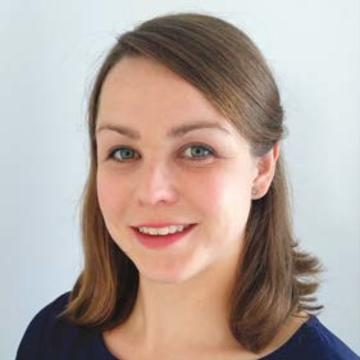Working in Science: Stories and Tips from Oxford Alumni
There are many opportunities available in the science sector, including careers in research, creating new technologies, developing or refining manufacturing processes, or innovating medical solutions. Scientists are likely to be involved in research, development and analysis in organisations ranging from research divisions of global companies to niche technology firms, with other options including government- or charity-funded research institutes, hospitals, and university research.
Science and technology span diverse disciplines and so too does the range of opportunities available to graduates. Read the below career stories from Oxford University alumni for insights into what roles in science involve, the trajectory your career could take, and tips for finding the right role for you.

Dr Joanna Bagniewska - Senior Lecturer in Environmental Sciences, Brunel University London. Communications and Public Engagement Officer, Department of Paediatrics, University of Oxford
DPhil in Zoology, Linacre College, 2013
What: I split my time between an academic career in zoology, and a research support role in communications and public engagement. For half the week I lecture, design curricula and do research; for the other I prepare newsletters, build and maintain websites, write press releases and plan public engagement activities. In my spare time, I also do freelance science communication and coaching.
Career path: After my DPhil, I lectured at Nottingham Trent University and the University of Reading, while pursuing science communication as a hobby. I won FameLab Poland, which led to collaborations with journalists and science writers, and gave me an understanding of how the media works. I presented at TEDxWarsaw and Soapbox Science, taught at summer schools and began performing science stand-up comedy – and learnt a lot in the process! Even though academics sometimes consider public engagement to be a ‘distraction’ from ‘real work’, the experience I gained landed me my first permanent position at Oxford University.
Why: Having a multi-pronged career offers more job security, provides diverse learning opportunities and means that I don’t have to sacrifice any of my interests. I was not prepared to give up zoology – but simultaneously I acknowledged that it is a difficult and highly competitive field, and I needed to use my transferrable skills to find a backup plan. My current jobs complement each other: I use my communications and public engagement expertise in lectures, and my research background to better understand the scientists I work with in my communications role. However, sometimes the work adds up to more than one full-time job!
Advice: Your degree is more than just academic skills, it’s an opportunity to try out a range of new activities. Do it – you never know what will come in handy! Use diverse, unusual experiences to your advantage; they will set you apart from other applicants. And finally, always ask yourself: Why am I doing this? What is my goal? How do I measure my success?

Charlotte Martin - Trainee Patent Attorney, Boult Wade Tennant LLP
MEng Engineering Science, Mansfield College, 2019
What: Patent attorneys are specialist legal agents that combine an in-depth understanding of intellectual property law with strong scientific and communication skills. We assist clients in seeking patent protection for their inventions and advise on infringement of existing patents. I am a trainee patent attorney working in the high-tech and electrical department of one of the larger European intellectual property law firms.
My day-to-day work involves reading about a wide variety of emerging technologies to identify the novel features and commercial value of an invention. I then distil this information into arguments, designed to overcome objections raised by the patent office examining a patent application. Other tasks include corresponding with our clients and drafting new patent applications. The profession is definitely worth considering as an alternative to a career as a scientific researcher, academic or engineer.
Why: Towards the end of my degree, I was considering three potential career paths: academia, engineering, and patent law. I chose patent law over academia and engineering because of the range and diversity of work. I typically only work on one invention for a day or two at a time, before switching to focus on something new. In the past month alone, I have worked on aircraft control systems, blockchain networks, juicing devices, micro LED arrays and much more. Patent law also affords clear and structured career progression. It takes between three and five years of on-the-job training to become a chartered patent attorney, during which you work on real cases and are closely supported by supervisors who value your technical input.
Advice: For those interested in patent law, I recommend applying for the vacation schemes and open days offered by most large patent firms. These vacation schemes and open days provide an opportunity to learn all about the firm, its people, and its culture, so can be really helpful in deciding where you want to apply. They may also give you application hints and tips, or an opportunity to informally meet the partners who will be interviewing you. I would also say it is worth getting your application in early. I started applying for trainee roles at the end of my third year and was able to secure a job before starting my fourth year. This meant I could focus on my studies, and never had to worry about fitting job applications or interviews around my lectures and tutorials.

Sam Hatfield - Scientist, European Centre for Medium-Range Weather Forecasts
DPhil Environmental Research, Jesus College, 2020
What: I conduct research into different methods of simulating the Earth’s atmosphere and oceans on computers in order to improve the quality of weather forecasts. In particular, I study the interface between meteorological science and supercomputing, a burgeoning area of computational science that will have real importance in attempting to adapt to climate change. My day-to-day work involves computer programming and data analysis, but also plenty of communication with colleagues and at conferences. This makes for a good balance all round, similar to that of a postdoctoral researcher in a university but without so much pressure to obtain funding and write papers.
Career path: I wanted an application for my physics and computing experience with a demonstrable benefit to society and chose the field of weather and climate prediction. Over the four years of my DPhil I made sure to conduct research that wasn’t just interesting to me but also topical, keeping in mind my future career prospects. In tandem, I started to make connections with researchers at my current workplace. As I was finishing up, I was very lucky that my current position, which is closely related to my DPhil research, became available, so I applied and was accepted.
Advice: Firstly, remember that graduation is not the end of the learning process. In many ways I learned more about “how things work” in the first year of my post-graduation job than the previous eight years of higher education. Secondly, it’s perfectly okay if you don’t know if the job you start with is right for you – it’s not a lifelong commitment. You will have plenty of other things on your mind when finishing your degree, so to begin with just try to find something that broadly suits you. Finally, when approaching recruiters, try to have a clear example to demonstrate each of the skills that you are marketing. For example, a school outreach talk to demonstrate communication skills, or perhaps an open dataset you help maintain to demonstrate data analytics skills.

Ulrike Künzel - Senior Research Scientist, AstraZeneca
DPhil in Pathology, Lincoln College, 2017
What: As a scientist in early research and development in the pharmaceutical industry, I work on the very early steps of the drug discovery process: the identification of new drug targets for a variety of diseases. The diseases I work on can vary depending on the project, and range from cancer to metabolic diseases. Therefore, I research a variety of different cell types and disease phenotypes which are analysed with high-throughput fluorescent microscopes. My day-to-day job involves planning, performing and analysing experiments, meetings with my project team (which includes experts from other departments), group or departmental meetings, as well as operational tasks such as writing risk assessments. My work is very collaborative, and I interact frequently with scientists from other disciplines that are involved in the data analysis or experimental design. We also collaborate with academia and attend and present at scientific conferences.
Why: I chose a career in the pharmaceutical industry because I wanted to apply the scientific skills that I had acquired at university to projects that have an impact on patients. I also wanted to learn about the process of drug discovery and be involved in novel exciting science applied to a variety of diseases.
Career path: After my PhD I secured Medical Research Council funding which allowed me to stay in my PhD lab for an additional six months, before moving into my first industry position as a scientist in a contract research organisation (CRO). CROs perform research and development for other companies, which enabled me to contribute to several projects for different pharmaceutical companies. The insight into the industry, as well as the research and project management skills I gained at the CRO, helped me to secure my current position in a pharmaceutical company.
Advice: Successfully applying for the first position outside of academia is often difficult. It helps to be flexible as there are many ways into industry positions, such as postdoctoral and graduate schemes and collaborations. Consider taking a transition step to reach your desired job, e.g. through a CRO or start-up company to acquire more skills that are applicable for your next career steps. Use your network to learn more about the day-to-day work, as well as open positions in the companies you are applying for.
Looking for more?
The alumni profiles above were originally featured in the 2022 Oxford Guide to Careers.
For more alumni career stories, tips on how to build applications that stand out, how to improve employability skills, and more, read the Guide.




